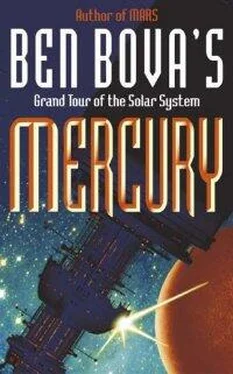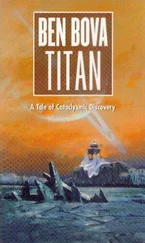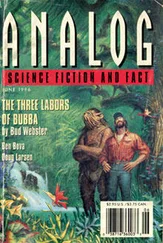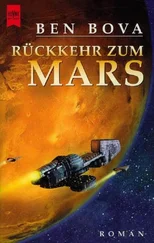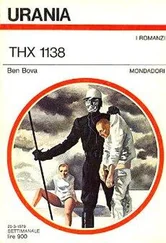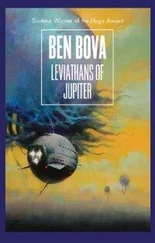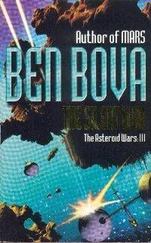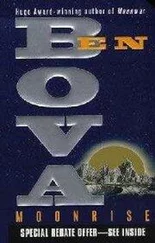Ben Bova - Mercury
Здесь есть возможность читать онлайн «Ben Bova - Mercury» весь текст электронной книги совершенно бесплатно (целиком полную версию без сокращений). В некоторых случаях можно слушать аудио, скачать через торрент в формате fb2 и присутствует краткое содержание. Год выпуска: 2005, ISBN: 2005, Издательство: Hodder & Stoughton, Жанр: Космическая фантастика, на английском языке. Описание произведения, (предисловие) а так же отзывы посетителей доступны на портале библиотеки ЛибКат.
- Название:Mercury
- Автор:
- Издательство:Hodder & Stoughton
- Жанр:
- Год:2005
- ISBN:978-0-340-82395-8
- Рейтинг книги:4 / 5. Голосов: 1
-
Избранное:Добавить в избранное
- Отзывы:
-
Ваша оценка:
- 80
- 1
- 2
- 3
- 4
- 5
Mercury: краткое содержание, описание и аннотация
Предлагаем к чтению аннотацию, описание, краткое содержание или предисловие (зависит от того, что написал сам автор книги «Mercury»). Если вы не нашли необходимую информацию о книге — напишите в комментариях, мы постараемся отыскать её.
Mercury — читать онлайн бесплатно полную книгу (весь текст) целиком
Ниже представлен текст книги, разбитый по страницам. Система сохранения места последней прочитанной страницы, позволяет с удобством читать онлайн бесплатно книгу «Mercury», без необходимости каждый раз заново искать на чём Вы остановились. Поставьте закладку, и сможете в любой момент перейти на страницу, на которой закончили чтение.
Интервал:
Закладка:
Ben Bova
Mercury
History will remember the inhabitants of [the twentieth] century as the people who went from Kitty Hawk to the moon in sixty-six years, only to languish for the next thirty in low-Earth orbit. At the core of the risk-free society is a self-indulgent failure of nerve.
— Buzz Aldrin, Apollo 11 astronautA species with all its eggs in one planetary basket risks becoming an omelet.
— Stephen Webb Where Is Everybody (Copernicus Books, 2002)To the memory of my friend and colleague, the star-seeker Robert Forward;
and to A.D., of course;
but most of all to the beauteous Barbara.
PROLOGUE: THE LONG SEARCH
When, in disgrace with Fortune and men’s eyes,
I all alone beweep my outcast state…
As he had every night for more than twelve years, Saito Yamagata wearily climbed the winding dark stone stairway to the top of Chota Lamasery’s highest tower. He could feel the cold winter wind whipping down from the low entrance to the platform at the top. It was going to be a long, bitterly cold night. No matter. Yamagata was seeking atonement, not comfort. Atonement—and something more.
Once he had been a giant of global industry. Yamagata Corporation had even reached beyond the Earth to build the first solar-power satellites. Men trembled at his slightest frown; fortunes were made when he smiled. Then he had been struck down by an inoperable brain cancer and died.
That had been Yamagata’s first life. Yamagata’s only legitimate son, Nobuhiko, had personally administered the lethal injection that allowed the doctors to pronounce him clinically dead. More carefully than an ancient Pharaoh, Yamagata was preserved in a stainless steel sarcophagus filled with liquid nitrogen to await the day when his tumor could be safely removed and he might be brought back to life.
By the time he was cured and revived, Nobu was physically the same age as his father. Yamagata burst into laughter when he first saw his son: it was like looking into the mirror when he shaved. With great wisdom, he thought, Yamagata declined to resume his position at the head of the corporation. Nobu had done well, and to demote him now would shame his son intolerably. So the elder Yamagata retired to this lamasery carved into the distant Himalayas to contemplate his first life. However, he did not live as the lamas did; he had comfortable furniture and decorations carried laboriously up the mountains to his bare stone cell. He maintained contact with the outside world through the latest electronic communications systems, including a satellite relay lofted especially for him alone. To the despair of the grand lama, who earnestly wanted to teach Yamagata the way to enlightenment, he brought in his own cook and even managed to gain weight. And he began to write his memoirs.
Perhaps because he dwelt on his former life, Yamagata found it impossible to stay entirely away from the corporation he had founded. He spoke to his son often over the videophone system in his quarters. He began to offer advice to Nobu. He envisioned a grand plan for Yamagata Corporation, a plan that extended far beyond the Earth. He led the corporation into the Asteroid Wars.
It took the slaughter of the Chrysalis habitat to shock Yamagata into realizing what he had done. More than a thousand helpless men, women, and children were massacred senselessly, needlessly.
I did not order the attack, he told himself. Yet he found that he could not sleep. Even his cook’s most tempting preparations became tasteless, unappetizing to him. In his mind’s eye he kept seeing those terrified, innocent people screaming in helpless horror as their space habitat was torn apart.
It took Yamagata many weeks to realize that he felt more than guilt. For the first time in his lives he felt shame. He was ashamed of what he had set in motion. I did not order the attack, he repeated to himself. Still, it was the inevitable consequence of the war that I willingly started.
Unsure of himself for the first time in his life, racked by a sense of shame he had never felt before, Yamagata begged for a private audience with the grand lama, hoping the old man could soothe his inner turmoil.
“There has been a tragedy,” he began, hesitantly.
The grand lama waited for him to continue, sitting in silent patience on the low couch of his chamber, his head shaved bald, his ascetic face bony, hollow-cheeked, his dark mahogany eyes squarely on Yamagata.
“There is a war going on in space,” Yamagata continued. “Far from here. In the Asteroid Belt.”
“Even here, such rumors have been whispered,” said the grand lama, his voice little more than a soft murmur.
“A few days ago more than a thousand people were killed,” Yamagata stumbled on. “Slaughtered. In a space habitat.”
The lama’s lean face went gray.
His heart pounding, Yamagata finally blurted, “It may have been my fault! I may have caused their deaths!”
The grand lama clutched at his saffron robe with both hands. Yamagata thought the old man was having a heart attack. He stood before the lama, stiff with shame and guilt, silent because he had no words to express what he felt.
When at last the grand lama recovered his self-control he looked into Yamagata’s eyes with a stare that pierced to his very soul.
“Do you accept responsibility for these murders?” he asked, his voice now hard as iron.
It was not easy for a man of Yamagata’s pride and power to stand there humbly asking forgiveness from this aged, robed lama. He feared that the old man would expel him from the lamasery, shame him, accuse him of polluting the very air they were breathing.
“I do,” he whispered.
The grand lama said, “For more than four years you have lived among us, but not as one of us. You have used our sanctuary and our way of life for your personal convenience.”
Yamagata said nothing. It was true.
Slowly, in words as hard and unyielding as the stones of the mountain aerie itself, the grand lama told Yamagata that he must seek true atonement or suffer the deadly weight of guilt forever.
“How do I do that?” Yamagata asked.
The lama was silent for many moments. Then, “Become one of us, not merely among us. Accept our way. Seek your path to atonement. Seek enlightenment.”
Yamagata bowed his acceptance.
Heavy with remorse, Yamagata started out on the path to atonement. He sent his cook back to Japan, got rid of his comfortable furniture and electronic equipment, moved into a bare cell, and tried to live as the lamas did. He fasted with them, prayed with them, slept on a hard wooden pallet. And every night, winter or summer, he climbed the high tower to spend hours alone in contemplation, trying to meditate, trying to find true atonement in his soul.
The grand lama died, since the sect did not believe in rejuvenation treatments, and was replaced by a younger man. Still every night Yamagata climbed his weary way and sat cross-legged on the cold stone floor of the tower’s platform, waiting for—what? Forgiveness? Understanding?
No. Yamagata realized over the slow passage of the years that what he truly sought was enlightenment, a satori, a revelation of the path he must follow.
Nothing. Night after night, year after year, not a glimmer of a hint. Yamagata prayed to the deaf heavens and received nothing in return. He wondered if the fault was in him, if he was not worthy of a sign from the vast universe. Deep in his soul, though, he thought that perhaps all this meditation and mortification was nothing more than cleverly packaged nonsense. And this troubled him, because he realized that as long as he harbored such thoughts, he would never find the path he so desperately sought.
Читать дальшеИнтервал:
Закладка:
Похожие книги на «Mercury»
Представляем Вашему вниманию похожие книги на «Mercury» списком для выбора. Мы отобрали схожую по названию и смыслу литературу в надежде предоставить читателям больше вариантов отыскать новые, интересные, ещё непрочитанные произведения.
Обсуждение, отзывы о книге «Mercury» и просто собственные мнения читателей. Оставьте ваши комментарии, напишите, что Вы думаете о произведении, его смысле или главных героях. Укажите что конкретно понравилось, а что нет, и почему Вы так считаете.
